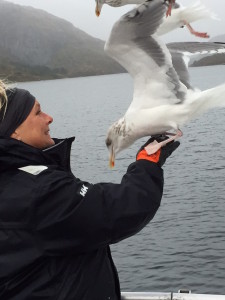[“Feeding Seagulls”; Tengelfjord, Norway, 2015]
Lately I’ve been thinking about a Ray Bradbury short story I must have read fifty years ago. Here’s how I remember it: a man pays an enormous amount of money to time-travel. At the time of his back-through-eons trip, a fierce presidential campaign wages; it pits a blowhard, right-wing, bullying, hate-monger versus a peace/love candidate. And the peace/love candidate is way ahead in the polls.
Now, this time-traveler had been repeatedly cautioned by the people operating the time machine not to leave a specially designated boardwalk. ( I can’t remember where he traveled—the Jurassic Period, maybe?) But, of course, he does step off the wooden path. And accidentally steps on a small insect. When he returns to his own time period, he’s amazed to discover that the bully is now a clear front-runner. The language he’d spoken had also morphed.
Bradbury explains why the bully won (He probably explained why language had radically changed, too, but I never understood that bit): The death of that one insect began a chain of depressing events, beginning with the subsequent death of another creature—a bird, perhaps—that had depended on that particular insect for its survival and then . . . And thus unfolded an alternative world dominated by an abiding sense of Not Enough. Deprivation. Fear. Might Makes Right. Me First.
Is it possible that, post 9/11, many now believe we live in that same mean, selfish, dog-eat-dog world Bradbury so insightfully created, a world so fear-filled that a bully could be seen a savior?
I wonder.
*From Elizabeth Strout’s excellent My Name is Lucy Barton (And, by the way, this softness was viewed with revulsion by one character.)




